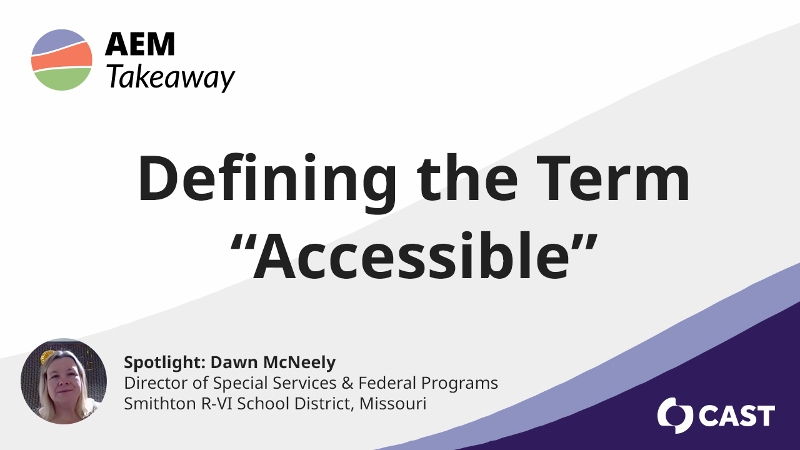AEM Takeaways
The AEM Takeaways series is a collection of short and engaging learning modules on topics related to providing and using accessible materials and technology. Each module includes a brief video featuring an AEM Center team member explaining a term, concept, or practice, followed by a professional from the field who provides a practical perspective. With each module, you’ll also find additional resources related to the topic. Use these to extend the video for training and professional learning in your state, district, university, job training program, parent center, or other setting. Have an idea for an AEM Takeaway topic? Send it to our team at aem@cast.org.
Foundations of Accessible Educational Materials
The first three videos of the AEM Takeaways series introduce the concept of accessibility and how it applies to common materials provided in education. You’ll learn who benefits from accessibility and the definitions and differences among the terms “accessible,” “accessible educational materials,” and “accessible formats.”

Defining the Term “Accessible”
Build an understanding of what accessibility is and why it is important to have a common understanding of accessibility, especially when working with students with disabilities who require accessible materials and technologies.
National AEM Center at CAST
2023

Defining Accessible Educational Materials
Build an understanding of how accessibility applies to educational materials, including what makes a material accessible across the widest range of learner variability.
National AEM Center at CAST
2023

Defining Accessible Formats
Build an understanding of what accessible formats are and how they can be used to break down barriers with print and digital text based materials for eligible students.
National AEM Center at CAST
2023
NIMAS and NIMAC
In this next series of the AEM Takeaways, you’ll gain insight into how the National Instructional Materials Access Center (NIMAC) supports K-12 students who require accessible formats. Additionally, you’ll learn about the National Instructional Materials Accessibility Standard (NIMAS), which is used to create various accessible formats for K-12 students with vision impairments and/or print disabilities. Throughout this series, you will develop a better understanding of NIMAC, the national source file repository center for K-12 instructional materials and NIMAS, the standard and specification for the instructional materials that are provided through the NIMAC. Lastly, the series covers how NIMAS and procurement of instructional materials work together to ensure timely delivery of accessible formats.

NIMAC Basics
The National Instructional Materials Access Center supports K-12 students who require braille and other accessible formats by providing states with a national source file repository to help expedite the production of these formats. In this video, you will explore the basics of NIMAC and develop a better understanding of the process.
National AEM Center at CAST
2024

NIMAS 101
The National Instructional Materials Accessibility Standard (NIMAS) is a special source file format that is used to produce a range of accessible formats on behalf of K-12 students with vision impairments and/or print disabilities.
National AEM Center at CAST
2024

NIMAS and Procurement
Under IDEA 2004, the authority to require publishers to send files to the NIMAC is entirely in the hands of customers—states and districts. Instructional materials procurement is central to ensuring that the NIMAC will have the files for the materials your students need, when they need them.
National AEM Center at CAST
2024
